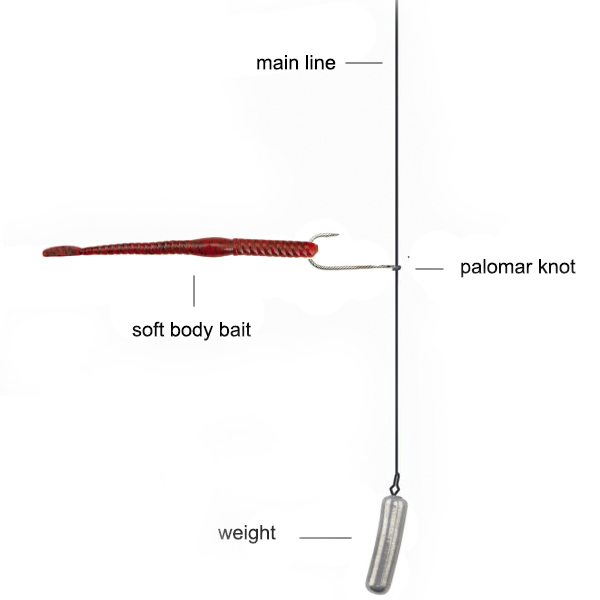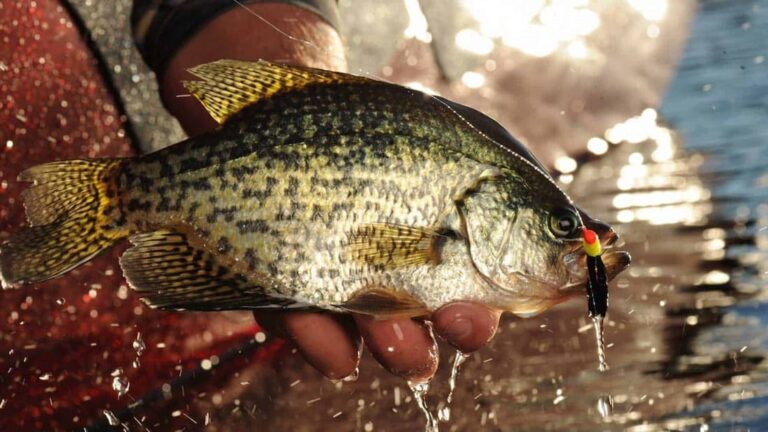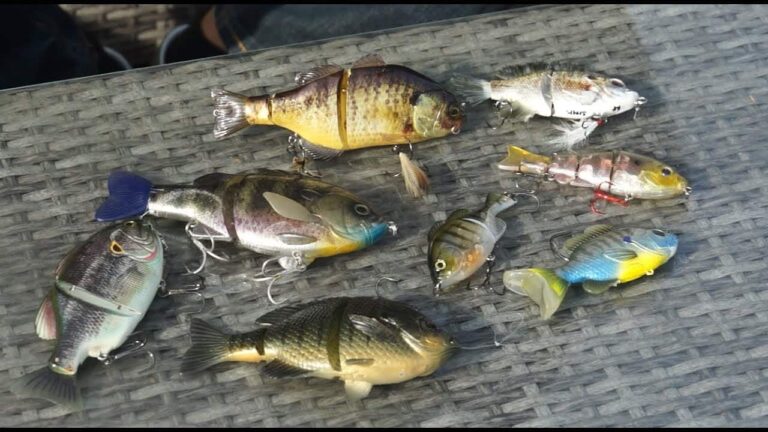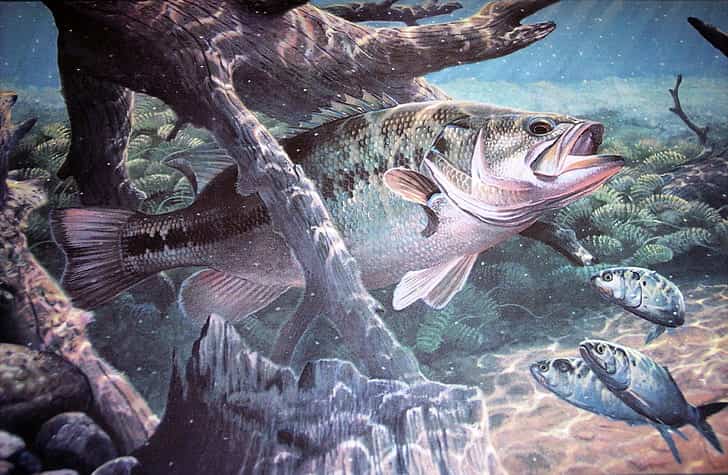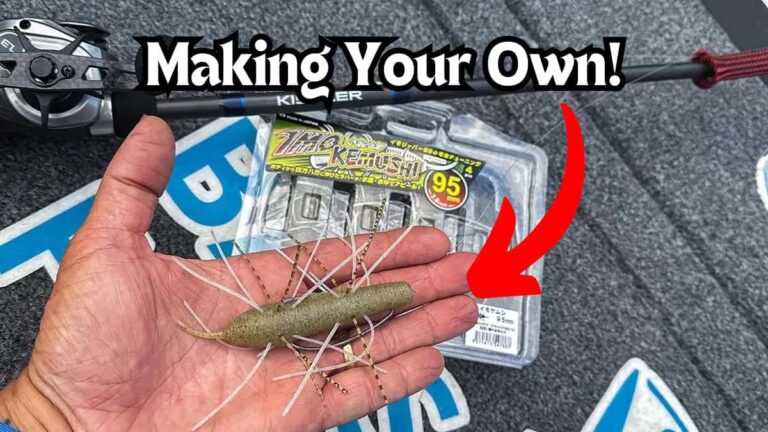Drop Shot Fishing: Finesse Bass Fishing Rig
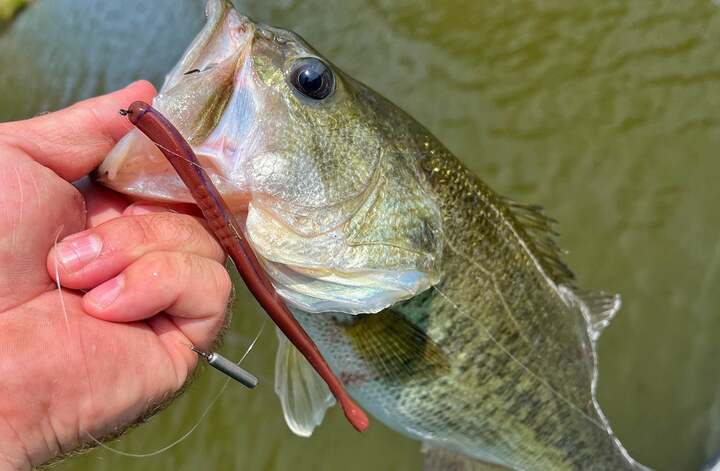
Drop shots can get event the most lockjaw bass to bite.
Drop shot is my go-to rig when bites get tough and other baits don’t seem to be working.
The drop shot has an incredible action and has caught me tons of bass.
What is Drop Shot Fishing?
Drop shot fishing is a finesse technique used in angling, primarily for bass. It involves suspending the bait above the bottom using a specialized rig.
The rig typically consists of a hook tied to the mainline, with a weight attached below the hook.
The soft plastic bait is then rigged on the hook, creating a natural and enticing presentation.
Drop Shot Rig Setup
The drop shot is a finesse fishing technique that involves suspending your bait above the bottom, enticing those bass to strike. Here are the key components you need to know:
- The Hook: You’ll need a specialized drop shot hook, often a light-wire or fine-wire hook. It’s designed to keep your bait in a horizontal position and maximize hooking efficiency.
- The Leader: This is the line segment between the hook and the weight. It’s usually shorter than the mainline and allows your bait to stay separate from the weight, creating a natural and enticing presentation.
- The Weight: Unlike traditional rigs, the weight is positioned below the bait. It can be a cylindrical or teardrop-shaped weight, designed to provide subtle movement and maintain contact with the bottom while keeping your bait elevated.
- The Soft Plastic Bait: This is where the magic happens! You’ll attach various soft plastic baits to the hook, such as worms, finesse worms, creature baits, or minnow imitations. These baits come in different shapes, sizes, and colors to mimic the natural prey of bass.
Advantages of Drop Shot for Bass Fishing
- Tempting Suspended Presentation: One of the major advantages of the drop shot rig is its ability to suspend your bait above the bottom. This creates a tantalizing and lifelike presentation that bass find hard to resist. It’s like offering a snack right in front of their noses, and they just can’t help but take a bite.
- Versatility in Different Conditions: Whether you’re fishing in clear water, shallow areas, or around structures, the drop shot rig shines in various conditions. You can adjust the length of your leader and the weight placement to adapt to different depths and cover types. It’s a versatile technique that works its magic no matter where you’re fishing.
- Finesse Approach for Finicky Bass: Sometimes, bass can be a bit stubborn and picky about their meals. That’s when finesse fishing comes to the rescue, and the drop shot rig is a finesse angler’s dream. Its subtle presentation, combined with the realistic movements of the soft plastic bait, appeals to even the most finicky bass, enticing them into striking.
- Excellent Bottom Contact: With the weight positioned below the bait, the drop shot rig maintains excellent contact with the bottom. This allows you to feel even the slightest nibble or change in the underwater terrain. You’ll have enhanced sensitivity, giving you an edge in detecting those subtle bites.
- Less Snags and Tangles: Since the weight is positioned below the bait, the chances of getting snagged or tangled in vegetation or rocky structures are reduced. You’ll spend less time wrestling with underwater obstacles and more time focused on enticing those bass.
- Increased Hookup Rates: The drop shot rig’s unique hook placement, combined with the vertical presentation, leads to higher hookup rates. The exposed hook and the way it’s positioned make it easier for bass to take the bait without feeling much resistance, resulting in more successful hooksets.
Equipment for Drop Shot Fishing Rig
A. Fishing rod and reel selection: Choose a light or medium-light spinning rod paired with a quality spinning reel for optimal sensitivity and a smooth drag.
B. Fishing line types and recommendations: Use low-visibility fluorocarbon line (6-10 lb test) as the mainline and a lighter fluorocarbon or monofilament line (4-8 lb test) as the leader.
C. Essential terminal tackle for drop shotting: Get light-wire or fine-wire drop shot hooks (sizes 1/0 to 2/0), cylindrical or teardrop-shaped drop shot weights (1/8 to 1/2 ounce), and a variety of soft plastic baits like finesse worms, creature baits, and minnow imitations in natural and bold colors.
Attaching Hooks, Weights, and Soft Plastics

- Start by tying your mainline to the top eye of the drop shot hook using your preferred knot, such as a Palomar knot. Ensure it’s securely tied.
- Slide the tag end of the mainline through the eye of the hook, creating a tag end of about 8 to 12 inches.
- Attach the drop shot weight to the tag end of the mainline. You can use a variety of methods, such as tying on a drop shot weight directly or using a clip-on weight. Make sure it’s secure and doesn’t slip off easily.
- Now, it’s time to rig the soft plastic bait. Take your chosen bait, such as a finesse worm or creature bait, and insert the point of the drop shot hook into the head or nose of the bait. Push it through about a quarter to a half-inch, ensuring it’s securely hooked.
- Depending on the length of the bait, you can rig it in various ways. For shorter baits, you can rig them completely straight. For longer baits, you can rig them with a slight bend or wacky-style by hooking the bait in the middle.
- Take a moment to inspect the rig and ensure that the bait is straight, the hook is securely attached, and the weight is positioned below the bait.
By following these steps, you’ll have your hooks, weights, and soft plastic baits perfectly attached to your drop shot rig. It’s crucial to ensure everything is secure and presented naturally to entice those bass into striking.
Fishing Drop Shot Effectively
Mastering how to work the bait effectively is key to enticing bass with your drop shot rig. Follow these tips to maximize your chances of getting those bites:
- Gentle Shaking and Twitching: Start by gently shaking your rod tip to impart subtle movements to the bait. This mimics the natural movements of injured prey, attracting the attention of nearby bass. You can also incorporate occasional twitches to add extra action and entice more aggressive strikes.
- Lift and Drop Technique: Another effective method is the lift and drop technique. Lift your rod tip slowly to elevate the bait off the bottom, then allow it to drop back down. This creates a falling motion that bass find irresistible. Repeat this lifting and dropping action while maintaining contact with the bottom.
- Dragging and Drag Pauses: Dragging the bait along the bottom can be highly effective. Slowly retrieve the rig, making occasional pauses to let the bait settle and rest on the bottom. This can trigger reaction strikes from bass that are closely monitoring the area.
- Vertical Jigging: If you spot fish on your fishfinder or suspect they’re suspending off the bottom, try vertical jigging. Drop your rig straight down and use short, sharp upward motions of the rod tip to impart a darting action to the bait. This mimics a fleeing prey and can trigger aggressive strikes.
- Experiment with Retrieves: Vary your retrieval speed, rhythm, and the duration of pauses to find what works best on a given day. Sometimes bass prefer a slow and subtle presentation, while other times they respond better to a more aggressive or erratic retrieve. Be willing to experiment and adjust your technique accordingly.
Remember, the key is to create a natural and enticing presentation that mimics the behavior of prey.
Adjustments Based on Water Conditions
- Water Clarity: Use natural colors in clear water and brighter colors in murky water.
- Water Depth: Employ finesse techniques in shallow water and consider vertical jigging in deeper water.
- Bottom Composition: Drag your bait along rocky bottoms and use lift-and-drop techniques in vegetation or softer bottoms.
- Water Temperature: Adjust your presentation to be slower and more subtle in colder water and more aggressive in warmer water.
- Weather Conditions: Tailor your retrieval speed and technique to match calm or windy conditions and adapt to the bass’s activity level.
Location and Seasonal Considerations
When it comes to drop shot bass fishing, considering the location and seasonal variations can greatly enhance your chances of success. Here are some key points to keep in mind:
- Prime Bass Fishing Locations: Identify areas where bass are likely to be found. Look for structure such as rocks, submerged vegetation, points, drop-offs, or ledges. Bass are often found near these features as they provide cover and ambush points. Also, pay attention to areas with a mix of shallow and deep water, as bass tend to move between these zones.
- Seasonal Variations: Understand how the seasons impact bass behavior. In spring, bass move to shallow areas for spawning, so focus on shallow flats, coves, or near shorelines. During summer, as water temperatures rise, bass may retreat to deeper water or seek shade. In fall, they become more active and feed heavily to prepare for winter. Winter fishing requires a slower and more finesse approach.
- Water Temperature: Pay attention to the water temperature as it can influence where bass are located and their feeding patterns. In general, bass tend to be more active and aggressive in warmer water, while they become sluggish in colder temperatures. Adjust your presentation and technique accordingly.
- Local Knowledge and Research: Take advantage of local knowledge, fishing reports, and resources specific to your fishing area. This information can provide valuable insights into the best locations and techniques that work well during different seasons. Researching the habits and preferences of bass in your region will give you a competitive edge.
These applications of the drop shot are much different from the Tokyo rig, which is similar to the drop shot.
Tips for Success in Drop Shot Bass Fishing
- Pay attention to your line and leader selection for optimal invisibility and sensitivity.
- Vary your bait selection and experiment with different colors and sizes to match the bass’s preferences.
- Adjust your presentation techniques such as shaking, lifting and dropping, and dragging based on the bass’s activity level.
- Stay observant of water conditions, including clarity, depth, and bottom composition, to adapt your approach accordingly.
- Keep an eye on the weather and adjust your retrieval speed and technique to match calm or windy conditions.
- Practice patience and maintain a gentle touch to detect and respond to subtle strikes.
- Maintain contact with the bottom to maximize your chances of enticing bass in their preferred feeding zone.
- Stay versatile and be willing to adapt your strategy based on the location, season, and behavior of the bass.
- Continuously learn and gather local knowledge about your fishing area to improve your understanding of bass behavior.
- Above all, enjoy the process and the thrill of drop shot rig bass fishing!
Best Soft Plastics for Drop Shot Fishing
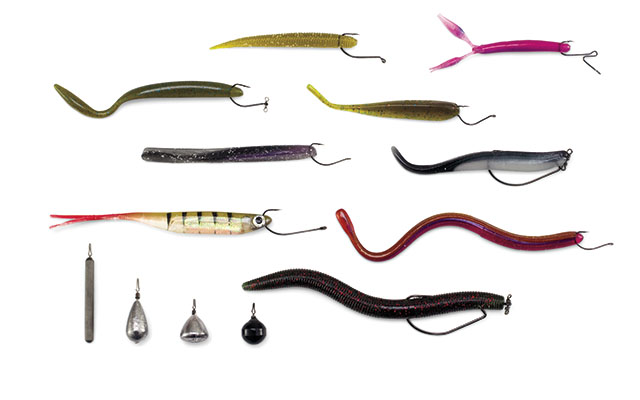
When it comes to drop shot rig bass fishing, choosing the right soft plastic baits can make all the difference. So, let’s dive into some conversationally recommended options that bass find irresistible:
1. Finesse Worms
These slender, straight-tailed worms are a classic choice for drop shotting. Their subtle, undulating action triggers bass to strike. Opt for colors like green pumpkin, watermelon, or natural shad to imitate common prey.
2. Creature Baits
Creature baits with multiple appendages and enticing profiles can be excellent choices. Their lifelike movements and bulkier profiles create a tempting target for bass. Try out crawfish or creature bait designs in colors like black and blue, junebug, or green pumpkin.
3. Minnow Imitations
Bass can’t resist the allure of a minnow-like soft plastic bait. Choose options that mimic the shape, size, and coloration of baitfish. Pearl white, silver shad, or smoke hues can be effective choices to imitate a variety of minnow species.
4. Shad or Baitfish Imitations
If you’re targeting bass that are feeding on shad or other baitfish, select soft plastic baits that closely resemble their appearance. Look for options with silver or white coloration, along with realistic scale patterns.
5. Stick Baits
These slim, elongated baits provide a subtle and natural presentation. They can be rigged either wacky-style or nose-hooked. Stick baits in shades of green pumpkin, watermelon, or natural browns tend to be reliable options.
Recap of Drop Shot Bass Fishing
- The drop shot rig is a finesse technique that suspends the bait above the bottom, enticing bass to strike.
- Equipment needed includes a light or medium-light spinning rod, low-visibility fluorocarbon line, drop shot hooks, drop shot weights, and a variety of soft plastic baits.
- Attaching hooks, weights, and soft plastic baits involves securely tying the mainline to the hook, attaching the weight to the tag end, and rigging the bait on the hook.
- Working the bait effectively includes gentle shaking, lifting and dropping, dragging, and vertical jigging techniques.
- Adjust the presentation based on water conditions such as clarity, depth, bottom composition, water temperature, and weather conditions.
- Location and seasonal considerations involve targeting prime bass fishing locations, understanding seasonal variations, and researching local knowledge.
- Tips for success include paying attention to line and leader selection, varying bait selection, adjusting presentation techniques, staying observant of water conditions, and practicing patience.
- Troubleshooting and common challenges include dealing with snags and hang-ups, modifying the rig for specific scenarios, fine-tuning the leader length, detecting subtle bites, and adapting to changing conditions.
Taking this Off the Hook
Get ready to embark on an exciting fishing journey with drop shot rig bass fishing!
By applying the knowledge and techniques we’ve covered, you’ll increase your chances of landing impressive catches.
So grab your gear, adapt to the conditions, and enjoy the thrill of drop shot rig bass fishing. Tight lines and happy angling!

